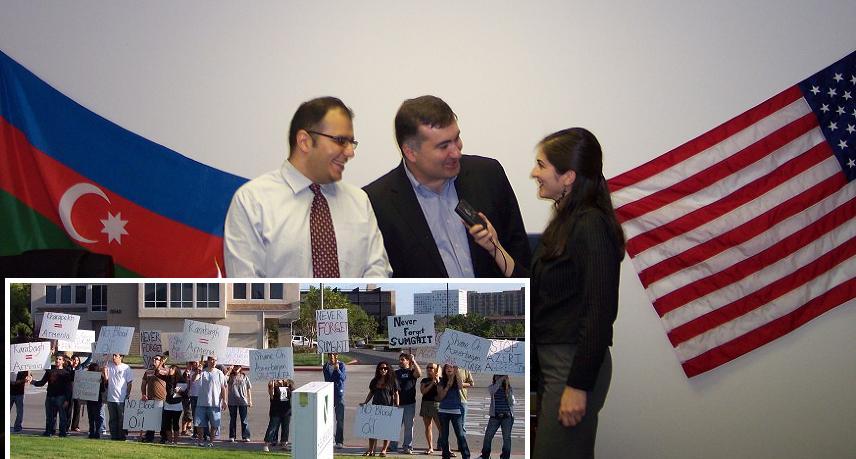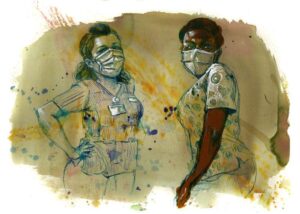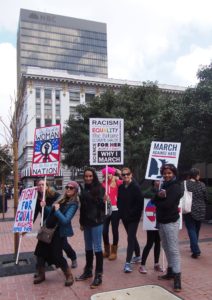Azerbaijani view of Gul’s visit to Yerevan

Today a World Cup qualifying game between the Turkish and Armenian national football teams will take place in Yerevan. Armenian President Serge Sarkisian invited his Turkish counterpart to “watch the game together” in an article he wrote for the Wall Street Journal, July 9. After this article, President Abdullah Gul decided to go to Yerevan… Some have said Gul showed “the foresight and the courage” needed to act. Some have questioned why Gul should visit a country they refer to as Turkey’s enemy.
What about Azerbaijani side?
President Gul’s visit to Yerevan has come under a heavy criticism of Azerbaijani mainstream media, some officials and independent analysts. So I talked to Azerbaijani-American Council (AAC) – Javid Huseynov to get some information about their feelings for Gul’s visit to Yerevan.
“President Gul’s landmark visit to Yerevan today may open a new chapter in Turkey’s relations with its troublesome neighbor. Media and analysts in Turkey, Armenia and other countries attempt to provide a variety of analyses citing primarily positive sides of this symbolic gesture.
In Azerbaijan, Mr. Gul’s Yerevan visit has come under substantial criticism of the media, various officials and independent analysts. Certainly, the government of Azerbaijan has its own views in this regard, which may have been conveyed to Prime Minister Erdogan upon his recent visit to Baku. Azerbaijani position in this regard is naturally shaped by the unresolved Karabagh conflict. Speaking from a moral standpoint, Mr. Gul accepted this invitation from a man who participated in Karabagh war atrocities, namely, gave orders during the brutal Khojaly massacre against Azeri Turks in 1992. In fact, Mr. Sarkissian, now President of Armenia, is also the author of the following words:
“before Khojali, the Azerbaijanis thought that they were joking with us, they thought that the Armenians were people who could not raise their hand against the civilian population. We were able to break that [stereotype].” (Thomas De Waal. “Black Garden: Armenia and Azerbaijan through Peace and War”, NYU Press,2004
From Azerbaijani perspective?
A trip by President Gul would be seen similar to a hypothetical visit by a Turkish head of state to Bosnia upon an invitation from Radovan Karadzic or a hypothetical visit by Azerbaijani head of state to Turkey upon an invitation from Abdullah Ocalan. In legal terms, there is no difference between the actions of Karadzic in Bosnia, Ocalan in Turkey, and those of Sarkissian in Azerbaijan.
However, let’s put aside Azerbaijani position as one-sided, and look at this visit from a position of an independent observer.
First of all, Turkey severed its relations with Armenia in 1993, as a result of Armenian occupation of Karabagh and 7 surrounding districts, all internationally recognized parts of Azerbaijan. I shall remind that Karabagh war resulted in 30,000 civilian deaths, out of which 25,000 were Azeri Turks, an ethnic cleansing and exodus of close to 1 million Azeris from their homes. The Turkish condition for the restoration of those relations was simple – Armenia must respect international law, withdraw forces, allow refugees to return to their homes and start negotiations about the future of Karabagh region.
There is nothing ambiguous in this Turkish condition, in fact, there are 4 UN Security Council resolutions from 1993, calling upon Armenian forces to withdraw from Azerbaijan proper and allow for the return of civilians. Yet Armenia up to date has not fulfilled this international demand. In fact, over the last 15 years, Armenia has actively dragged the peace process, while reinforcing and resettling the occupied territories, destroying any Azeri trace on them. Furthermore, Armenia established an unrecognized separatist regime of “Nagorno-Karabagh Republic”, and two recent Armenian presidents, Robert Kocharyan and Serge Sarkissian, are products of this regime. Armenian side claims the right of “self-determination of people Karabagh”, with a little deviation: this right is only for Armenian population. As a reminder, prior to Karabagh war, third of Karabagh’s population were Azeri Turks.
The second condition of Turkey was for Armenia to cease its support for the international legal recognition of interethnic strife that took place in Eastern Anatolia in the course of World War I as Armenian genocide. As we know this effort is led by Armenian diaspora, which plays an important role in politics of Armenia. Yet in past decade, it became obvious that Armenian government would not be able to stop diaspora even if it officially refrained from supporting its efforts.
The third and most important condition was for Armenia to recognize and respect the borders of neighboring countries, of course, primarily Turkey and Azerbaijan. Armenia is the only country in the world, which does not recognize the borders of Azerbaijan and occupies part of its territory. Being a signatory of 1921 Kars Treaty, Armenia also does not respect the borders of Turkey, in fact, in Armenian legislature, media and press, Eastern Anatolia is referred to as Western Armenia. Moreover, there are now occasional voices in Armenia wishing to raise the issue Armenian-settled Javakheti region of Georgia, opening a way for disrespecting the integrity of yet another neighboring country.
Do you think that the recently elected president of Armenia will make changes in their policies?
With the bloody and undemocratic election of Serge Sarkissian in March 2008, Armenia did not seem to change its decade-old position on any of the fundamental issues of concern for Turkey. Despite the fact that its confrontational policy against neighbors resulted in locked borders, isolation from important regional projects and slow economic development, Armenia has not stepped back from its position for an inch. Sarkissian insists on reopening relations without preconditions, i.e. Armenia and diaspora will continue doing what they were doing but Turkey should eventually open the border.
What is the benefit for Turkey?
Perhaps, Mr. Gul and Turkish diplomats can answer this question better. But even without their opinion, this visit by Abdullah Gul can be viewed as a reward for Armenia’s aggressive policy and essential failure of Turkish principles. It’s psychological victory for Armenia and a boost to Serge Sarkissian, with little or no return for Turkey.
Recent war between Russia and Georgia, further limited Armenia’s choices, and perhaps, after some time with now three borders closed, Armenian government would be forced to rethink its unconstructive policy in the region. President Gul’s visit, however, offers a needless incentive rather than helping Armenia to come to terms with reality and obey international law.
What’s your view of Turkey’s position regarding recent events in Caucasus?
As we know, in the wake of Russia’s recent aggression against Georgia, Prime Minister Erdogan came up with the initiative of a new regional security arrangement, involving Azerbaijan, Armenia, Georgia, Turkey and Russia. I can’t comment on this proposal in detail, as not much is known about it. But the timing of this proposal and parties involved in it do not offer a very bright perspective for this idea. First of all, Azerbaijan’s territorial integrity is violated by Armenia without any desire to revert its policy. Georgia’s integrity is violated even more boldly by Russia against all letters of international law. Turkey is perceived as an enemy by Armenia and Armenians for four generations now. So I am not sure what kind of cooperation Mr. Erdogan is envisioning.
But I also would like to comment on Turkey’s stance vis-à-vis events in Georgia. Perhaps, due to similar conditions in Kosovo and Northern Cyprus, Turkey could not be more vocal on the issue of violation of Georgia’s integrity. However, in my view, Turkish government should have responded with humanitarian aid and support to Georgia. For many years now, Georgia has courageously stood against Russian provocations to provide a path for delivering Azerbaijani hydrocarbons to Turkey. In other words, Georgia took all risks in its Western orientation and to the benefit of Turkey and its position as a new energy hub. Turkey should not have left Georgia without support at such crucial moment.
What about the position that was taken by Turkish government?
The action of Turkish government in this regard may raise questions about the reliability of Turkey as a regional ally for both Azerbaijan and Georgia. In other words, Turkey has demonstrated that in matters pertaining to the region of Caucasus, it cannot be an independent player, but only act in tandem with Russia or the United States. Combined with Gul’s visit to Yerevan, in my mind, these indicate the weakening of Turkey’s position in the region.
Of course, Turkey has to uphold its own interests above all, yet it’s not quite visible what benefits would Turkey gain from Armenia while losing Azerbaijan and Georgia. Aside from ethnic affinities between Azeri and Anatolian Turks, the Turkish energy interests shall be considered as well.
Couldn’t we think Turkey is searching for new opportunities?
What sort of opportunities? Armenia’s purpose is to open the border, reinforce its stance vis-à-vis Azerbaijan. Armenia does not plan to step back from any of its positions, and it’s naïve to imagine that Armenian troops will leave Karabagh region and allow refugees to return to their homes or will stop supporting the historical blackmail of Turkey after border is opened.
The public in Turkey as well as Turkish diaspora is being constantly brainwashed via various media outlets that opening of borders will bring benefits to Turkey too. If so – what are they? Armenia is economically dependent on border opening, Turkey is not. But opening of borders without compromise is a meaningless retraction from Turkish position, which will only strengthen and embolden the non-constructive position of Sarkissian’s regime vis-à-vis both Azerbaijan and Turkey.
Do you think this visit will affect the fraternal relations Azeri and Anatolian Turks in the U.S.?
I want to reiterate that from the position of diaspora, a visit by President Gul won’t affect the fraternal relations of Azeri and Anatolian Turks in the U.S. Our brotherhood is shaped not by political establishment but by centuries of common Turkic ethnic roots, language, identity, and culture, and no one is in power to change these.
Javid Huseynov, PhD is the current president of Azerbaijani-American Council (AAC) established in 2006, and currently operating in California and Texas. AAC is a community organization of Azeri-Americans, working also closely with ATA-SC and its local chapters, American Jewish Committee (AJC) and other community grassroots organizations in California and nation-wide. AAC website is available at http://www.azeris.org.
In professional career, Dr. Huseynov is a senior software engineer and scientist, working in Orange County. Since 1995, he actively participated in grassroots activities of Azerbaijani and Turkish diaspora in the United States.
(Turkish Journal)



